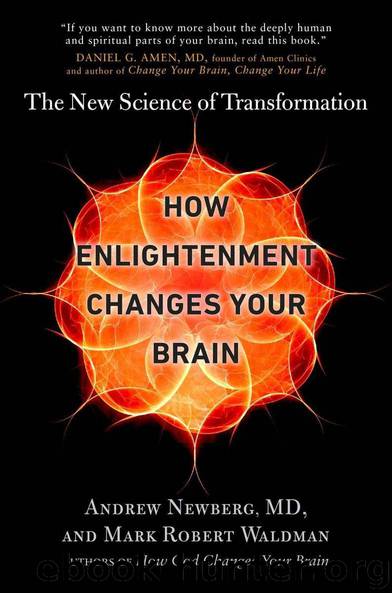How Enlightenment Changes Your Brain: The New Science of Transformation by Andrew Newberg & Mark Robert Waldman

Author:Andrew Newberg & Mark Robert Waldman [Newberg, Andrew]
Language: eng
Format: epub, mobi
Publisher: Penguin Publishing Group
Published: 2016-03-14T23:00:00+00:00
GOD’S ORIGINAL NAME
Although one does not have to believe in God to reach Enlightenment, God often can provide an important focus for facilitating it. But it depends on how you define God. Think about it for a moment: What does God mean to you? Our research shows that very few people—less than 10 percent—define this mysterious word in a similar way!
The word “god” first appeared in a sixth-century Christian book called the Codex Argenteus.2 Prior to that time, “theos” was used throughout most of the early Christian writings. It was a term used for any deity, and originally came from the Greek word “Zeus.” The use of the word “allah” can be traced back to the eighth century or earlier, and continues to be widely used by Middle Eastern Christians, Jews, and Muslims. Most scholars agree that Allah is a variation of the Aramaic Elah and the Hebrew Eloah, or Elohim, a generic word that referred to the highest and most powerful of all the deities, two of whom—named El and Al—were written about in ancient Assyrian, Phoenician, and Babylonian texts.3
God and Allah are interchangeable in the sense that both refer to a singular deity who created and oversaw humankind. But since the true name of this deity could not be spoken outside the temple that was destroyed nearly two thousand years ago, indirect names were given. For example, God’s name is sometimes referred to using the Hebrew letters “yod,” “heh,” “vav,” “heh” (YHVH), an unpronounceable word.
In both Jewish and Muslim mystical traditions, there were many names that were used for God: Infinite Knowledge, Perfect Goodness, All Powerful, Righteous, Supreme Being, Miracle Maker, Emancipator, Defender, All Wise, All Forgiving, Life-giver, and the Bringer of Death. In some contemporary mystical circles, Allah has been called the Source, the Breath, or the Oneness of everything. These mystical traditions recognized the indescribability of God as well as the importance of an Enlightenment experience in which people feel as if they “touched” God in some profound way. In the mystical paths of Christianity, Judaism, and Islam, the follower strives to feel a deep unification with God by surrendering one’s self to this holy presence. When this occurs, it often leads a person into a powerful new belief system.
In Islam, the classic creed of the Shahada states that “There is no God but God.” In Judaism, there is a foundational prayer, the Shema, which similarly states, “The Lord is God, the Lord is One.” In the Christian faith, the Apostle’s Creed reads, “There is only one true God, eternal, infinite, and unchangeable, incomprehensible, almighty, and ineffable.” Thus, in the three Abrahamic traditions of the West, there is a mutual consensus in the oneness of God, and in that oneness there are hundreds of qualities and powers associated with this mysterious word.4
Download
How Enlightenment Changes Your Brain: The New Science of Transformation by Andrew Newberg & Mark Robert Waldman.mobi
This site does not store any files on its server. We only index and link to content provided by other sites. Please contact the content providers to delete copyright contents if any and email us, we'll remove relevant links or contents immediately.
| Anatomy | Animals |
| Bacteriology | Biochemistry |
| Bioelectricity | Bioinformatics |
| Biology | Biophysics |
| Biotechnology | Botany |
| Ecology | Genetics |
| Paleontology | Plants |
| Taxonomic Classification | Zoology |
Sapiens: A Brief History of Humankind by Yuval Noah Harari(13128)
The Tidewater Tales by John Barth(12047)
Do No Harm Stories of Life, Death and Brain Surgery by Henry Marsh(6351)
Mastermind: How to Think Like Sherlock Holmes by Maria Konnikova(6278)
The Thirst by Nesbo Jo(5821)
Why We Sleep: Unlocking the Power of Sleep and Dreams by Matthew Walker(5681)
Sapiens by Yuval Noah Harari(4581)
Life 3.0: Being Human in the Age of Artificial Intelligence by Tegmark Max(4544)
The Longevity Diet by Valter Longo(4468)
The Rules Do Not Apply by Ariel Levy(3939)
The Body: A Guide for Occupants by Bill Bryson(3863)
The Immortal Life of Henrietta Lacks by Rebecca Skloot(3844)
Why We Sleep by Matthew Walker(3799)
Animal Frequency by Melissa Alvarez(3772)
Yoga Anatomy by Kaminoff Leslie(3726)
Barron's AP Biology by Goldberg M.S. Deborah T(3646)
The Hacking of the American Mind by Robert H. Lustig(3602)
All Creatures Great and Small by James Herriot(3543)
Yoga Anatomy by Leslie Kaminoff & Amy Matthews(3421)
